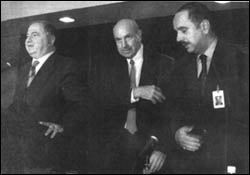 |
| Vol. 1 No. 11 | November 1999 |
The Iraqi National Congress (INC) held a plenary conference last month in New York to choose a new leadership, bolster the unity of Iraq's deeply fractious opposition movement and develop a coordinated strategy to bring down President Saddam Hussein. "The new INC . . . is becoming the voice of the Iraqi people and their resistance all over the country," said US Under Secretary of State Thomas R. Pickering in his address to the conference. "You have stood up as an expanding, dynamic, and responsible institutional partner, for all those who would openly support the aspirations of the Iraqi people.
 |
| Ahmad Chalabi (left), Under Secretary of State Thomas R. Pickering, and Sharif Ali Bin al-Hussein (right) |
The participants in the conference produced a new organizational charter and detailed reports concerning the political future of Iraq, human rights, and constitutional issues which, in the words an INC spokesman, collectively "represent a blueprint for a new Iraq." The most significant political resolution, adopted at the insistence of both major Iraqi Kurdish parties, was the approval of a federal system of government in post-Saddam Iraq. "The INC recognizes the legitimate national rights of the people of Iraqi Kurdistan on the basis of federalism and the national, historic, and geographic facts within the framework of a parliamentary, pluralistic, and democratic Iraq and will act to guarantee this constitutionally."1
The participants also agreed to "aggressively" lobby the international community for the indictment of Iraqi President Saddam Hussein and his senior officials for war crimes.
Military strategy was not discussed at great length, but Chalabi said this will be dealt with at a "less public forum in the future," probably in Kurdish-controlled northern Iraq. At the close of the conference, the INC released a statement requesting that the US extend the no-fly zones in Iraq to include the entire country and that "safe zones" in which Iraqi military vehicles are prohibited be established in the predominantly Kurdish north and Shi'ite south of the country. This would facilitate the implementation of a plan advocated by Chalabi whereby opposition forces first establish supremacy in the northern and southern periphery of Iraq and then gradually close in on the Sunni heartland where Saddam's power base is the strongest. This incremental plan, it is believed, will generate needed popular support along the way.
A large segment of the Iraqi opposition boycotted the conference, however. Most notably, the Teheran-based Supreme Council for the Islamic Revolution in Iraq (SCIRI) and the Iraqi Communist Party were not present. Dr. Mohammed Bahr al-Uloom, a widely respected Iraqi Shi'ite cleric, pulled out at the last moment charging that "the US isn't serious" about overturning the regime in Baghdad.
The Iraqi government brushed aside suggestions that the INC conference represented a serious challenge. "We, and all honest people in the world, ridicule the meeting of the Iraq opposition," Iraqi Vice President Taha Yasin Ramadan told Reuters on 1 November.
1 Al-Hayat, 1 November 1999.